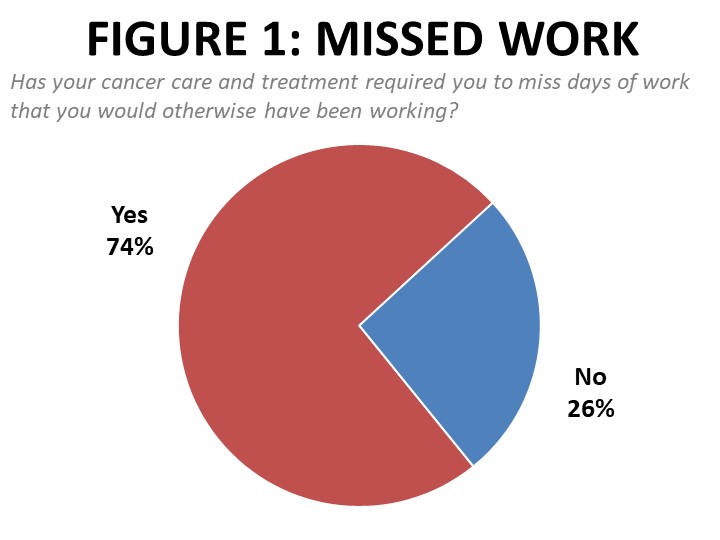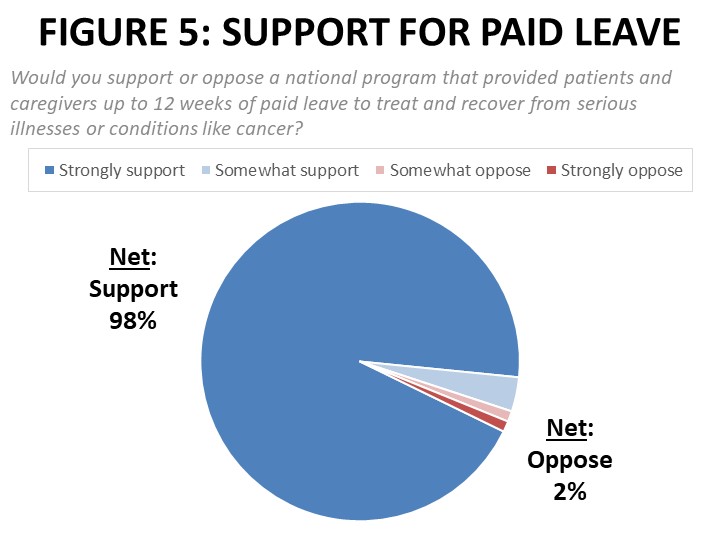Survivor Views: Missed Work and Paid Leave
Overview:
The American Cancer Society Cancer Action Network (ACS CAN) gives voice to cancer patients and survivors on critical public policy issues that affect their lives. As part of this effort, ACS CAN deploys surveys to better understand cancer patient and survivor experiences and perspectives, through our Survivor Views research panel. The panel is a group of cancer patients and survivors who respond to regular surveys and provide important insights to support ACS CAN’s public policy work at all levels of government.
Fielded October 22-November 19, 2021, the latest survey explores cancer patients’ and survivors’ experiences with having to miss work due to their cancer care and treatment, the impact of that missed work, and their views on a national paid medical and family leave program. The web-based survey was conducted among 1,248 patients and survivors nationwide diagnosed with or treated for cancer in the last seven years. Seventy-four percent of respondents have had to miss work due to their cancer care, and the questions summarized here were asked of that subset of 926n.
Key Findings:
- Three-quarters of cancer patients and survivors report missing work due to their cancer care and treatment.
- 69% have missed more than four weeks of work with 39% missing over three months of work.
- One-third of those who missed work for their cancer care and treatment did not receive any income for at least some of the time they missed work, and 13% lost or quit their jobs.
- 43% of those who had to miss work said the financial impact was very or somewhat difficult. Some types of cancer patients are more likely to experience these financial difficulties: women, respondents in their prime earning years, lower income earners, those who are less educated, and residents of southern states are most likely to say the impact has been very difficult.
- Support for a national paid leave program among cancer patients and survivors is nearly universal (98%), and 83% believe that a national paid leave program should provide more than four weeks of leave at a minimum.
Detailed Survey Findings:
Three Quarters of Cancer Survivors Have Missed Work; Most Have Missed More Than a Month
The overwhelming majority (74%) of cancer patients and survivors say their cancer care and treatment has required them to miss days of work that they would have otherwise been working. Nearly a quarter (23%) cite difficulty managing job responsibilities as one of the challenges of their cancer, while the pain (53%) and limitations in physical function (43%) experienced by cancer patients often limit daily activities, such as work.
The time needed away from work can be substantial for cancer patients. More than two-thirds (69%) have missed over a month of work, and 39% have missed more than three months. Just over half were able to receive all or part of their income for the time they missed, but nearly a third (32%) went without pay for at least some of the time they missed and 15% did not receive any income for any of the time they missed. Another 16% lost their job, quit, or had their hours reduced.


Higher income earners and those with a college or post graduate degree are more likely to have continued to receive at least some of their income, while those less educated and lower income earners were most likely to suffer more negative impacts. Just 3% of higher income earners (earning over $125,000 annually) report losing their job due to the time they missed for cancer care, compared to 31% of those earning under $70,000 per year and 34% of those earning less than $35,000 per year. Fortunately, 75% of patients who missed work were eventually able to return to the same job, but for 11% their job was not protected and another 10% chose not to return.
 The Financial Impact of Missed Work is Often Difficult and Unequal
The Financial Impact of Missed Work is Often Difficult and Unequal
Forty-three percent of cancer survivors say the financial impact of missed work has been somewhat or very difficult. The burden of the financial impact of missed work extends across several demographic groups, but women, respondents in their prime earning years, lower income earners, those who are less educated, and residents of southern states are most likely to say the impact has been very difficult.
Those with annual household incomes of $70,000 or less are three times as likely as those earning over $70,000 to report that the financial impact of having to miss work has been very difficult, and among those earning under $35,000 per year, 41% say the impact has been very difficult. Similarly, the 39% plurality of cancer survivors who have had to miss more than three months of work due to their cancer care and treatment (shown in Figure 4) are also more likely to say the financial impact has been very difficult.
Within the survey, respondents had the opportunity to share their experiences with having to miss work due to their cancer care and treatment and the impact that had on them and their family. Many of the comments illustrate the considerable pressure cancer patients often feel to keep working to preserve their income, insurance, or their job, even to the extent of impacting treatment decisions:
Support for a National Paid Leave Program is Nearly Universal
Regardless of whether they have missed work, cancer patients and survivors overwhelmingly support a national paid leave program, with 87% strongly supportive. Eighty-three percent believe that a national paid leave program should provide more than four weeks of leave at a minimum.


Methodology:
ACS CAN’s Survivor Views research initiative was designed to enhance the organization’s mission to end suffering and death from cancer. Data provided by cancer patients and survivors as part of this project allows for a greater understanding of their experiences and opinions on cancer-related issues and gives voice to cancer patients and survivors in the shaping and advocating of public policies that help prevent, detect, and treat cancer and promote a more positive quality of life for those impacted.
To ensure the protection of all participants in this initiative all research protocols, questionnaires, and communications are reviewed by the Morehouse School of Medicine Institutional Review Board.
The survey population is comprised of individuals who meet the following criteria:
- Diagnosed with and/or treated for cancer within the last seven years
- Over the age of 18 (parents of childhood cancer survivors were invited to participate on behalf of their minor children)
- Reside in the US or US territories
Potential Survivor Views participants were invited to participate through email invitations, social media promotion, and partner group outreach. Those who agreed to participate after reviewing the informed consent information completed a brief survey including demographic and cancer history information to inform analysis as well as topical questions as discussed in this document. The data were collected between October 22 and November 19, 2021. A total of 1,248 participants responded to the survey, providing a margin of error +/-2.8 percentage points at a 96% confidence level. The margin of error for the subset of 936n who have missed work due to their cancer care and treatment is +/-3.2 percentage points.
About ACS CAN
The American Cancer Society Cancer Action Network (ACS CAN) is making cancer a top priority for public officials and candidates at the federal, state and local levels. ACS CAN empowers advocates across the country to make their voices heard and influence evidence-based public policy change as well as legislative and regulatory solutions that will reduce the cancer burden. As the American Cancer Society’s nonprofit, nonpartisan advocacy affiliate, ACS CAN is critical to the fight for a world without cancer. For more information, visit www.fightcancer.org.